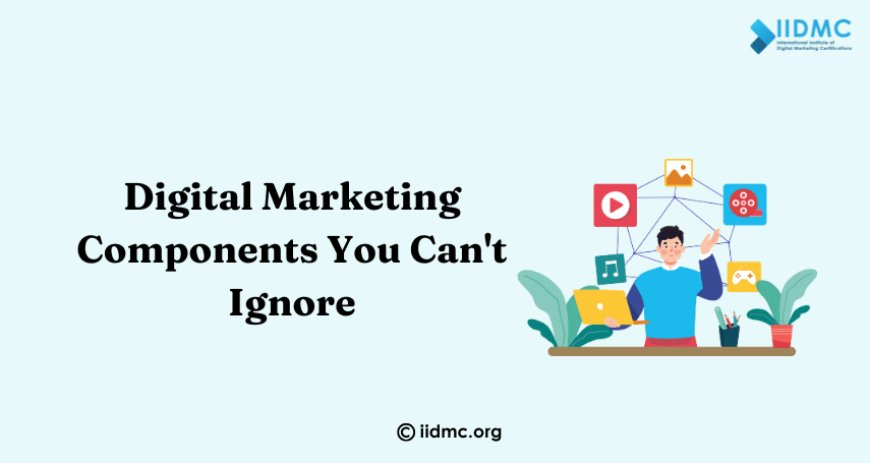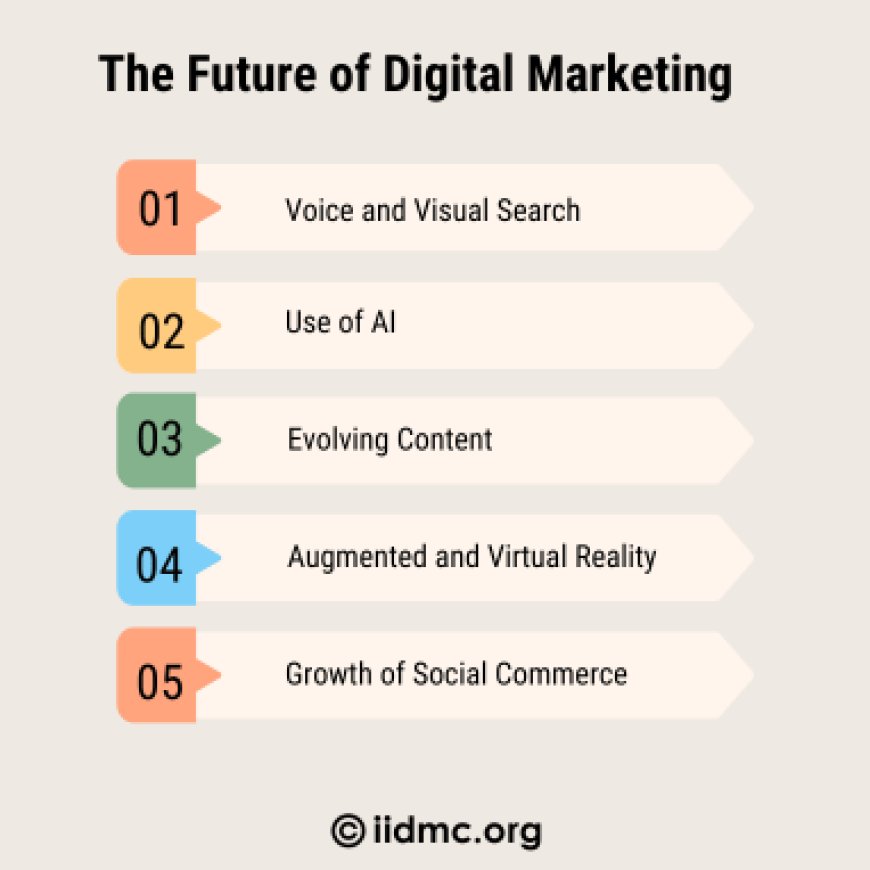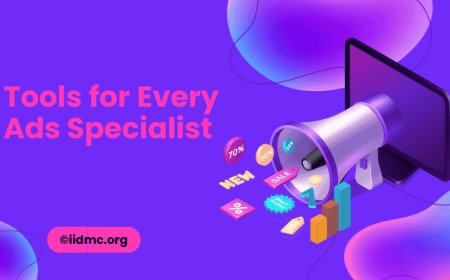Digital Marketing Components You Can't Ignore
Discover the essential digital marketing components you can't ignore for success, including SEO, content marketing, social media, email marketing, and data analytics to boost your online presence and drive results.

Understanding the components of digital marketing is more important than ever—especially for students eager to explore their career options. Imagine connecting with millions of people, sharing your ideas, and promoting your passions with just a few clicks. Digital marketing isn’t just for big companies; it’s a crucial skill that can give you a competitive edge in any field. This guide dives into the essential elements of digital marketing, from social media and search engine optimization (SEO) to content creation and email marketing. Whether you want to build your brand, launch a startup, or enhance your resume, mastering these components will give you the tools to succeed and make your mark online!
Key Components of Digital Marketing
Search Engine Optimization (SEO)
Search Engine Optimization, or SEO, is optimizing your website to rank higher in search engine results. When people search for information related to your business, you want your website to appear at the top of those results. Here’s how SEO works:
-
Keywords: These are the words and phrases that potential customers type into search engines. Researching and using relevant keywords in your content helps search engines. understand what your page is about.
-
On-page SEO: This involves optimizing individual pages on your website, including the use of meta tags, headers, and high-quality content.
-
Off-Page SEO: This focuses on building your website’s reputation and authority through backlinks from other reputable sites.
-
Technical SEO: This ensures that your website is easy to navigate and free of errors, which helps search engines crawl your site more effectively.
Content Marketing
Content marketing involves creating valuable, relevant content to attract and engage your target audience. This content can take many forms, including:
-
Blog posts: articles that provide information, tips, or insights related to your industry.
-
Videos: engaging visual content that can be shared on platforms like YouTube or social media.
-
Infographics: Visual representations of information that make complex data easier to understand.
-
Podcasts: audio content that allows you to discuss topics in-depth, making it easy for your audience to consume while on the go.
Social Media Marketing
Social media marketing is about using social media platforms to promote your business and connect with customers. Some popular platforms include:
-
Facebook: Great for sharing updates and photos and engaging with followers.
-
Instagram: Ideal for visual content, showcasing products or services creatively.
-
Twitter: Useful for quick updates and real-time engagement.
-
LinkedIn focuses on professional networking and B2B marketing.
Email Marketing
Email marketing involves sending targeted messages to your audience via email. This can include:
-
Newsletters: Regular updates about your business, industry news, or useful tips.
-
Promotional emails: announcements about sales, discounts, or new products.
-
Follow-up emails: messages sent after a purchase to thank customers and encourage feedback.
Pay-Per-Click (PPC) Advertising
Pay-per-click advertising is a model of online advertising where you pay a fee each time someone clicks on your ad. This is often used in search engine marketing (SEM) and social media ads. Key aspects include:
-
Google Ads: Advertisements that appear at the top of search engine results when users search for specific keywords.
-
Social Media Ads: targeted advertisements on platforms like Facebook and Instagram, based on user demographics and interests.
Affiliate Marketing
Affiliate marketing involves partnering with individuals or companies who promote your products in exchange for a commission on sales generated through their referrals. This can be done through:
-
Affiliate Links: Unique links that track sales and lead back to your website.
-
Influencer Marketing: Collaborating with social media influencers to promote your products to their audience.
Mobile Marketing
Mobile marketing targets users on their mobile devices, including smartphones and tablets. This encompasses:
-
Mobile-Optimized Websites: Ensuring your website is accessible and user-friendly on mobile devices.
-
SMS marketing: sending text messages to inform customers about promotions or updates.
-
In-App Advertising: Advertising within mobile apps to reach users while they’re engaged.
Customer Relationship Management (CRM)
CRM is a strategy for managing a company’s interactions with current and potential customers. It involves using technology to organize, automate, and synchronize sales, marketing, customer service, and technical support. CRM tools can help with:
-
Lead Management: Tracking potential customers and nurturing them through the sales funnel.
-
Customer Support: Managing customer inquiries and providing support effectively.
-
Data Management: Storing customer information and interaction history for better service.
Conversion Rate Optimization (CRO)
Conversion rate optimization is the process of increasing the percentage of users who take a desired action on your website, such as making a purchase or signing up for a newsletter. This can involve,
-
A/B testing: experimenting with different versions of web pages to see which one performs better.
-
User Experience (UX) Design: Enhancing the overall experience of visitors to make it easier for them to convert.
-
Clear Call-to-Actions (CTAs): Creating compelling buttons or links that encourage users to take specific actions.
Demand for digital marketing
-
Increased Online Presence: Businesses are shifting their focus online, leading to a greater need for effective digital marketing strategies to reach and engage customers.
-
Consumer Behavior Changes: More consumers are researching and shopping online, making digital marketing essential for brands to connect with their audience at the right time.
-
Cost-Effectiveness: Digital marketing often offers a higher return on investment (ROI). compared to traditional marketing methods, attracting businesses to invest more in online strategies.
-
Diverse Career Opportunities: The growing demand for digital marketing skills has created various career paths, including roles in SEO, content marketing, social media management, and analytics.
-
Global Reach: Companies can target audiences beyond their geographical boundaries, expanding their market reach and potential customer base.
The Future of Digital Marketing
Voice and Visual Search: As voice-activated devices and image searches become popular, marketers will need to adjust their content for these new search methods.
Use of AI: Artificial intelligence will help automate tasks, improve customer service with chatbots, and provide insights through data analysis.
Evolving Content: Video, interactive content, and live streaming will grow in importance as audiences seek more engaging experiences.
Augmented and Virtual Reality: These technologies will offer unique ways for brands to let customers interact with products, enhancing their shopping experience.
Growth of Social Commerce: Social media will increasingly become a shopping platform, allowing users to buy products directly from their favorite channels.

Digital Marketing Certifications
-
Digital Marketing Fundamentals: covers the basics of digital marketing, including key concepts and tools.
-
Search Engine Optimization (SEO): Teaches how to improve a website's visibility on search engines.
-
Social media marketing: focuses on promoting brands and engaging with customers on social media.
-
Content marketing: shows how to create and share valuable content to attract customers.
-
Email Marketing: Teaches how to design and send effective email campaigns.
-
Google Ads Certification: Trains you to create online ads using Google Ads.
Digital marketing is an essential part of any business strategy today. Understanding its key components—such as SEO, social media marketing, content marketing, email marketing, Google Ads, and analytics—enables businesses to connect effectively with their audience and drive growth. Certifications from IIDMC (Indian Institute of Digital Marketing and Communications) offer a structured way to learn these vital skills. By gaining knowledge in these areas through IIDMC certifications, you not only enhance your expertise but also increase your career opportunities in the digital marketing field. Accepting these components will equip you with the tools needed to succeed.





























